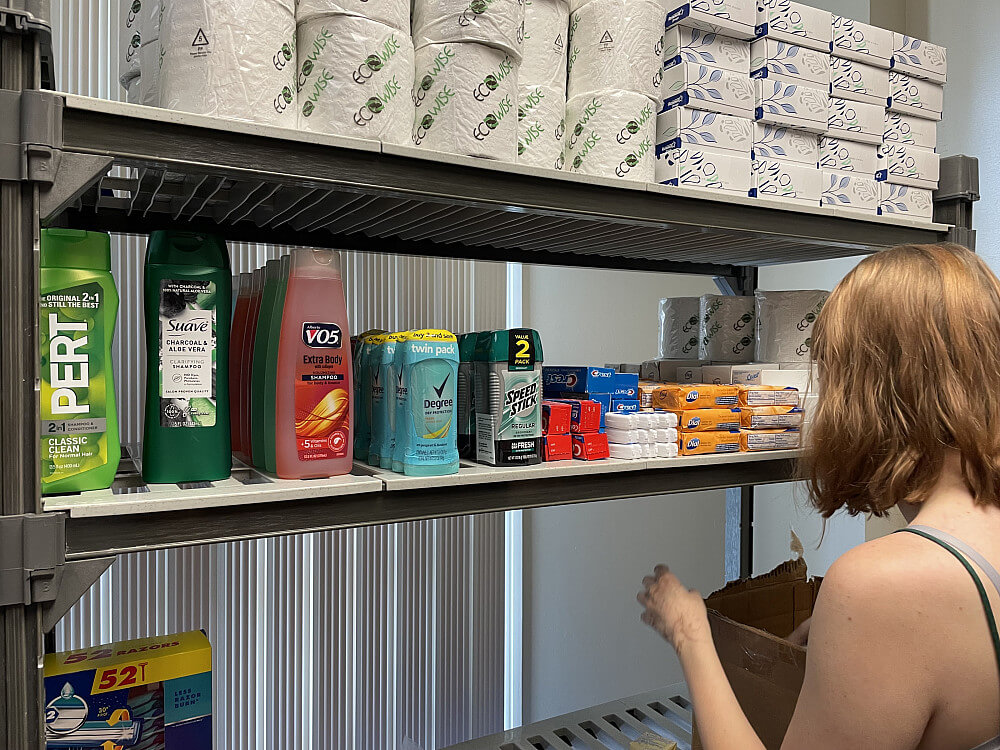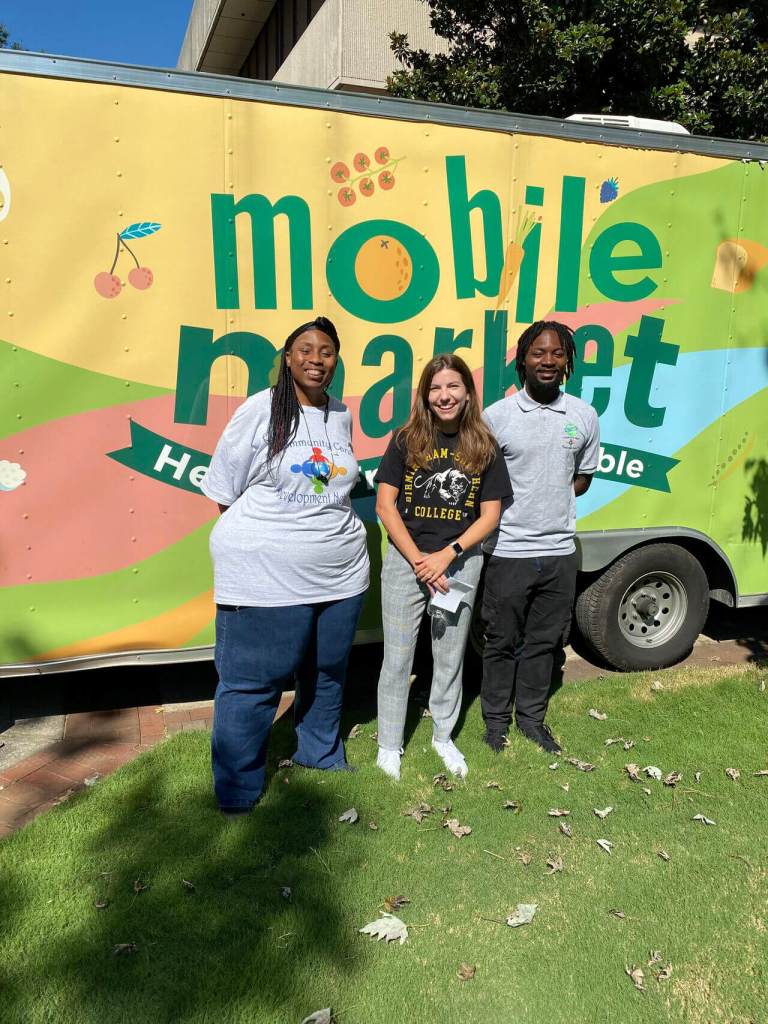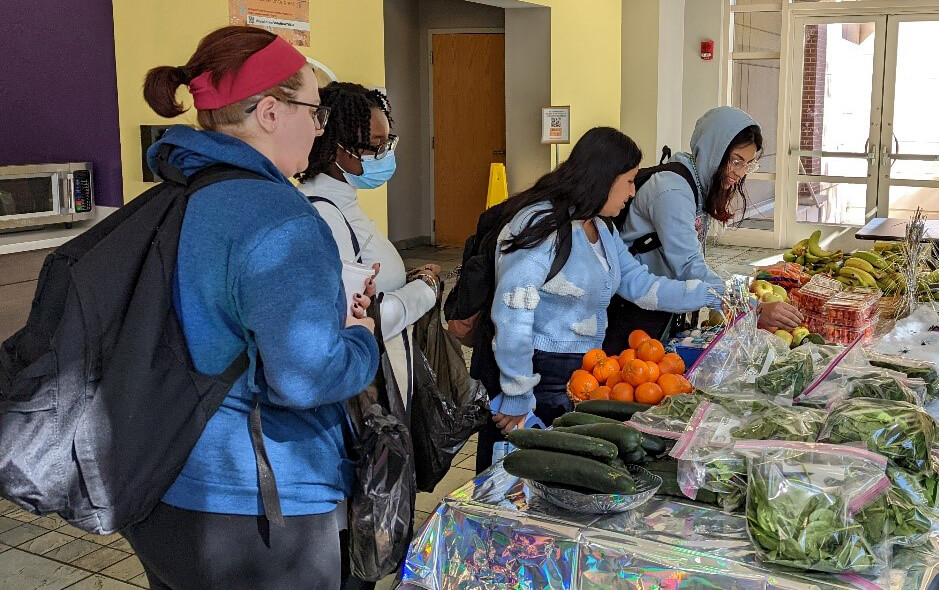
Atlanta – “On days when I was away from home from 7:00 a.m. to 6:00 p.m., I didn’t have to worry about eating because of the Koala Pantry. When my family’s refrigerator broke down for weeks, I was able to eat well. Without this resource, I wouldn’t To be able to complete any semester.”
Food insecurity on campus is often a hidden problem because students don’t want to admit they need it…until colleges create free or low-cost food ministries and find out how many students are using them.
Columbia College in South Carolina was one of seven colleges that received grants from Global Ministries last year to develop pantries or other ways to provide students with food and hygiene supplies. The colleges that received the grants, made possible by Sunday Human Relations offerings, were all United Methodist-affiliated institutions with large numbers of students of color enrolled from diverse racial and ethnic backgrounds.
At Columbia College’s Koala Pantry, some students who frequent the pantry revealed that they would not have been able to continue their college education without it. For students who do not have backup income for basic necessities, it is difficult to focus on being a full-time student while working to scrape together an income.
“The Koala Pantry has been one of my favorite services on campus,” noted another Columbia student. “I’ve used it several times, with several of my teammates, when we needed a quick snack between classes and practices. As a volunteer at the Koala Pantry this past spring semester (2023), I also witnessed how good it was for many other students. I noticed Many people rely on pantry supplies throughout the week.
Key partners provide support
While grants have been used to establish or renovate existing pantries, these full-time ministries need full-time associates to keep supplies stocked and volunteers working. All of last year’s grantees leveraged additional resources to keep their pantries viable throughout the year.
At Greensboro College in the Western North Carolina Conference, Tyler Smith, a former student, current seminarian and community service coordinator at Greensboro College, points to a number of ways they have found to support their new Pride Pantry, one of three available on campus.
Greensboro College works with its athletic teams and honor societies to host food drives to support the pantries. Additionally, they are partnering with Spartan Open Pantry, hosted by College Place United Methodist Church in Greensboro, to give students access to a larger food pantry that provides hot meals throughout the week.
“We hope to highlight food insecurity on campus and also plan to offer educational opportunities for our staff to learn more about this issue and make a difference in the lives of students,” Smith noted in a video about the Pride Pantry.
Emory and Henry College in Virginia opened the Stinger Supply Rack two years ago, and its Bonner Scholars Program is helping coordinate the pantry’s operation. The Appalachian Center for Civic Life helps provide volunteers. The campus food vendor, Sodexo, maintains food supplies and churches and individuals donate hygiene supplies.

Good grades accompany good health
In Waleska, Georgia, Reinhardt University has updated its warehouse to increase operating hours. Dr. Walter May, dean of students at Reinhardt, notes that the grant was used to expand access to the pantry using a card access system; Increase storage space. Install air conditioning and have a basic stock of hygiene products, as well as food preparation and cooking utensils, such as bowls, plates and utensils.
“Research shows that college students who lack access to reliable nutrition earn lower grades and experience higher levels of stress,” May says. “The food pantry is one of many University strategies that support our students and is an important part of the Student Health Center’s view of student life – caring for the whole person.”
Birmingham Southern College in Alabama used its grant to focus on an “e-semester,” or January semester, at the college, outside of the regular two-semester schedule. The students themselves developed the idea of creating a free food market during the extra semester that would provide fresh produce, bread, meat and dairy products. The market was free for all students and open 24 hours a day, 7 days a week. This resource has been embraced and used extensively by students; The shelves were nearly empty when restocking each week.

Students attending colleges and universities from diverse economic backgrounds often become financially independent for the first time and must learn how to balance work and being full-time students. Surprisingly, many campuses are far from affordable grocery stores, so students without cars find themselves living in a food desert, and if they miss a meal on campus, they go without food until the next meal is served. Working in partnership with global ministries, churches, businesses, and volunteer agencies, United Methodist-related organizations respond to this specific form of food insecurity.
Christy R. House is a consulting writer and editor for Global Ministries and UMCOR.
Evangelism and church revitalization
Establishing and nurturing new faith communities and supporting existing congregations seeking to increase membership and expand ministries in local communities have historical roots and contemporary implications for global ministries. missionaries who train pastors to plant churches in new places; Mission Initiatives, which starts new Methodist religious communities; Scholarships that help church leaders obtain the credentials and degrees they need to serve and serve; Networks that provide resources to racial and ethnic faith communities throughout the United States are examples of Global Ministries’ commitment to evangelism and church revitalization.
Human Relations Day is an opportunity to stand with other United Methodist churches to build the beloved community envisioned by the Rev. Dr. Martin Luther King, Jr. This special Sunday is designed at the denominational level to promote human relations and community outreach. By participating in the Human Relations Day offering, United Methodists embrace the power of relationships, the power of community, and the good news that all of God’s children have sacred value.
Gifts made on Human Relations Day, January 14, 2024, support the Community Developer Program as well as community advocacy through United Methodist Volunteer Ministries administered through Global Ministries.
Food insecurity on college campuses is a pressing issue that affects a significant number of students. Many individuals struggle to afford nutritious and sufficient meals, which can have a detrimental impact on their academic performance and overall well-being. As a result, it is crucial for universities and colleges to address this issue and offer support to those in need. By implementing various initiatives and programs, institutions can help alleviate food insecurity and ensure that all students have access to necessary resources for a successful college experience.

